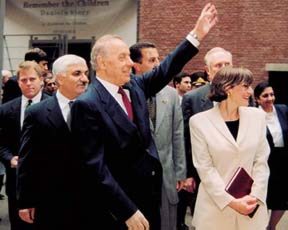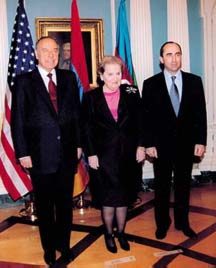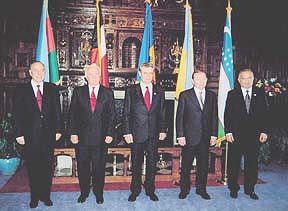|

Summer
1999 (7.2)
Pages
14-16
President Aliyev
Visits the U.S.
Current
Issues
President
Heydar Aliyev was in Washington, D.C. to attend the 50th Anniversary
of NATO from April 22-24, 1999. During his visit, he discussed
various issues. Here are edited remarks that he made on three
occasions on April 26 at the Center of Strategic International
Studies, the banquet of the U.S.-Azerbaijan Chamber of Commerce
and with the Editorial Board of the Washington Post.
  Kosovo Kosovo
It goes
without saying that the Kosovo problem is a very complicated
one. But we in Azerbaijan have been living with a similar problem
for the last decade. Beginning in 1988, Armenia tried to seize
part of Azerbaijan (namely Nagorno-Karabakh) and unite it with
its own territory. As a result, war broke out. Armenia's armed
forces managed to occupy about 20 percent of Azerbaijan's land.
To stop their aggression, we signed a cease-fire agreement five
years ago [May 1994].
Photo:
President
Heydar Aliyev visiting the Holocaust Museum in Washington, D.C.,
April 1999. Photo: Bagirov.
We would like to achieve a peaceful settlement. We are ready
to grant the highest degree of autonomy to Nagorno-Karabakh within
the Republic of Azerbaijan but the Armenian side does not agree
to this arrangement and, therefore, the issue remains unresolved.
In Yugoslavia, the war began when Kosovar Albanians tried to
claim self-rule for themselves because Milosovic had carried
ethnic cleansing in that region. We consider his action to be
criminal.
Our position is that the territorial integrity of each country
and each nation should not be violated. Therefore, we support
the territorial integrity of Yugoslavia. We are against separatism.
At the same time, we are against ethnic cleansing and against
genocide.
It goes without saying that we are against granting independence
to Kosovo-Albania. At the same time, we are against the violation
of the rights of the people of Kosovo. We believe that the best
solution would be to ensure the territorial integrity of all
Yugoslavia, but extend autonomy to Albanians of Kosovo within
Yugoslavia. Both sides should be compelled to put an end to the
conflict based on these principles.
Autonomy for Karabakh
  Well, if Armenia would
agree to accept the highest status of authority, then we can
negotiate the details. As for the example that you mentioned
of the people of Nagorno-Karabakh having their own police force,
of course, we would agree to give them the right to have their
own police force and carry guns to ensure the security of the
local people in Nagorno-Karabakh. You mentioned a land bridge
to Armenia, we absolutely have agreed to that-to allow a bridge
to link Nagorno-Karabakh to Armenia. Well, if Armenia would
agree to accept the highest status of authority, then we can
negotiate the details. As for the example that you mentioned
of the people of Nagorno-Karabakh having their own police force,
of course, we would agree to give them the right to have their
own police force and carry guns to ensure the security of the
local people in Nagorno-Karabakh. You mentioned a land bridge
to Armenia, we absolutely have agreed to that-to allow a bridge
to link Nagorno-Karabakh to Armenia.
Photo:
President
Aliyev with U.S. Secretary of State Albright and Armenian President
Kocharian in Washington on April 26, 1999. Photo: Bagirov.
We are also prepared to extend enormous power in economics. We
are prepared to allow them to broaden their authority and establish
direct economic relations with foreign countries. When I say
the highest degree of authority, there are only a few areas in
which they have to be subordinate to Azerbaijani authority. As
to the majority of issues, we would be willing to give them full
freedom and authority.
There are many similar autonomous countries throughout the world.
We are ready to grant Armenia the highest standards of autonomy
that exist in other parts of the world. But, undoubtedly, we
need to talk and negotiate the details with them. But I would
say this is almost equivalent to extending independence to Nagorno-Karabakh.
But Armenia does not agree to this arrangement.
Azerbaijanis in
Iran
  There are about 30 million
Azerbaijanis who live in Iran and who comprise nearly half of
the total population of Iran. But as a nationality, these Azerbaijanis
are completely deprived of their national rights. There are about 30 million
Azerbaijanis who live in Iran and who comprise nearly half of
the total population of Iran. But as a nationality, these Azerbaijanis
are completely deprived of their national rights.
The Iranian regime is very sensitive about this issue. But why
should that be-if all these Azerbaijanis want is to have the
right to attend schools in their own language and be able to
publish newspapers and books in their own language? They don't
want anything else. But the regime will not grant them these
rights.
During his presidential campaign, the current President of Iran
promised that if he were elected, he would grant those rights
to the Azeri population of Iran, based upon Article 15 of the
Iranian Constitution. But he has not carried out his promise.
These processes are underway in Iran, but the regime relies heavily
on religion and police force.
Relations
with the U.S.
GUUAM. New
alliance among the former Soviet Republics composed of Georgia,
Uzbekistan, Ukraine, Azerbaijan and Moldova. Presidents from
GUAAM nations gathered in Washington for NATO's 50th Anniversary
in April. (l-r) Heydar Aliyev (Azerbaijan), Eduarde Shevardnadze
(Georgia), Betru Luchinski (Moldova), Leonid Kuchma (Ukraine)
and Islam Karimov (Uzbekistan). Photo: Bagirov.
About two weeks ago, I received letters from President Clinton
and Secretary of State Madeleine Albright emphasizing their intention
to become more seriously involved in bringing about a peaceful
settlement to the Nagorno- Karabakh conflict. According to their
statements, the Administration has been trying and will continue
to make every effort to have Section 907 repealed. Today [April
26] I will have a meeting with Madame Albright. Definitely, we
will discuss this subject during that meeting as well.
 Section 907 Section 907
(U.S. law denying aid to Azerbaijan)
This is one of the most illustrative examples of injustice in
the world. It is unfortunate that we have been the targets of
this injustice. We have been trying for several years now to
get Section 907 repealed. This legislation, which denies direct
aid tothe Azerbaijani government, was passed in 1992 and drawn
up as if Azerbaijan were the aggressor [in the Azerbaijan-Armenian
conflict]. But, in fact, it is Armenia that has occupied 20 percent
of Azerbaijan. It is Armenia who currently occupies a major part
of the land on which lies the railroad that connects Baku with
Yerevan [the blockade for which Armenians blame Azerbaijan].
It is they who have restricted our capabilities.
Photo: President Aliyev celebrating
his 76th birthday on May 10, 1999, at the Omni Hotel in Cleveland,
Ohio, 11 days after heart surgery. (l-r) Son Ilham Aliyev, Turkish
friend Ihsan Dogramachi, President Aliyev, Cardiologist Murat
Tuschu and his wife. Photo: Khanlou
But in the U.S., everything is viewed vice versa. I would say,
instead of punishing Armenia, the U.S. is punishing Azerbaijan.
All these things deeply sadden and disappoint us because we look
to the United States as being the most democratic nation in the
world. It is simply unimaginable to us that such injustice continues.
Above all else, I want to be very frank with you. From the moral
point of view, we cannot tolerate this injustice in Azerbaijan
anymore. I don't think Azerbaijan deserves this injustice and
I hope that the U.S. Congress will finally manage to repeal it.
Estimates of Caspian
reserves
The
reserves in the Caspian are even more than what was announced
 four
years ago. When we signed the first contract in September 1994,
which we termed "The Contract of the Century," I could
never have imagined that after four years, our country would
have signed 16 contracts. Tomorrow, here in Washington, we are
going to sign three more contracts - Exxon, Mobil and Moncrief. four
years ago. When we signed the first contract in September 1994,
which we termed "The Contract of the Century," I could
never have imagined that after four years, our country would
have signed 16 contracts. Tomorrow, here in Washington, we are
going to sign three more contracts - Exxon, Mobil and Moncrief.
If there were less oil reserves in Azerbaijan, do you think that
these companies that originally signed up with us would still
be inclined to sign additional oil contracts? To date, 42 companies
representing 14 countries have signed 16 contracts. With tomorrow's
signing, the total investments in Azerbaijan's oil sector will
be $50 billion.
The estimates indicate that the energy reserves in the Azerbaijani
sector of the Caspian Sea are somewhere between 4 to 10 billion
tons. That was our early estimate. In reality, the reserves are
even greater. For example, we planned to produce 510 million
tons of oil [from the AIOC contract]. But now we see that we
will be producing 630 million tons. In other words, 120 million
tons more oil just from that first contract. We were expecting
to produce 500 tons per day from each well, but now we are producing
about 2,000 tons per well per day.
The articles you read in the Western media and the U.S. press
about reduced reserves originate from sources that oppose Azerbaijan's
oil strategy, including pro-Armenian forces. For example, we
know that Russia is against Azerbaijan's oil strategy, specifically,
against Western and American involvement in the Caspian region.
Therefore, they spread various rumors as you have mentioned.
There are no grounds for these rumors. The Caspian Sea has an
enormous amount of oil reserves, not only in the Azerbaijan sector
but in other sectors as well, especially in Kazakhstan.
Price of Baku-Jeyhan
oil pipeline
This is an issue that is currently being widely discussed. AIOC
has estimated the total cost of this route between Baku and Jeyhan
(Turkey) via Georgia to be $3.7 billion. From an economic point
of view, this was not feasible. However, Turkey has made its
own calculations and concluded that only $2.4 billion is needed
for its construction. If this pipeline can actually be constructed
for that amount, AIOC will have no objection in building it.
So the total costs for all aspects of this pipeline are being
worked out. The issue of tariffs will be worked out later. Turkey
has promised that they will ensure all conditions to make the
Baku-Jeyhan route a reality.
Sabotage of pipelines
Azerbaijan
is not the only one involved in constructing these pipelines.
In other words, we are constructing these pipelines in joint
cooperation with Western energy companies who are active in Azerbaijan.
For example, both pipelines-the Northern route [via Russia] and
the Western route [via Georgia]-have been constructed by the
AIOC consortium (Azerbaijan International Operating Company),
which is composed of 11 companies. The Supsa pipeline (which
involved $590 million in investment) belongs not only to Azerbaijan,
but to these oil companies as well. Together, we have been taking
measures to guarantee their security.
Proposed Transcaspian
pipeline
We favor the export of Turkmen gas via the Transcaspian pipeline
from Azerbaijan to Turkey. Turkmenistan and Azerbaijan are both
in agreement about this.
Turkmenistan's President has appealed to me requesting my support
for exporting Turkmen gas via Azerbaijan to Turkey. I promised
my support for this proposal, and we have had numerous telephone
conversations. There is no problem concerning it. I have received
representatives of American oil companies who are involved in
the construction of this Transcaspian pipeline and I have promised
Azerbaijan's support. I think this issue, in reality, is already
settled.
Recent Presidential
Elections
There
have always been critics. If everyone were to agree all the time
about an issue, it would mean that that thing has no value. But
there are two types of critics: critics who are just in their
appraisal and critics who are biased. In regard to the elections,
the majority of those critics were biased and because of that,
I did not pay attention to them.
About his son becoming
President
Well, there is pluralism in Azerbaijan and people who suggest
that he should become President can say whatever they think.
I don't have to comment on every view. Various discussions are
underway among the opposition about the son of Heydar Aliyev.
But just like them, Ilham Aliyev has the right to elect and to
be elected. As a citizen of the Republic of Azerbaijan, he can
enjoy his rights and use them whenever he wants. He is absolutely
independent in this issue.
You ask whether I would vote for him. Do you think that I wouldn't?
If I told you "no", you wouldn't believe me.
Russia's role in
South Caucasus
Russia
is a major power. They are our neighbors to the North. We have
always been desirous of having positive relations with them.
Russia is also one of the Co-chairs [along with the U.S. and
France] of the Minsk Group, the Committee within the Organization
on Security and Cooperation of Europe (OSCE) commissioned to
bring about a peaceful settlement to the conflict between Armenia
and Azerbaijan]. Therefore, we have always been desirous of seeing
Russia carry out this mission. Unfortunately, this has not yet
been achieved, either in terms of Russia's role or that of the
U.S. or France which are also co-chairs on this committee.
Given that Armenia is in conflict with Azerbaijan, we are concerned
that Russia fosters special relations with Armenia. I'm sure
you are aware that we learned in early 1997 that Russia had illegally
supplied Armenia with weapons worth $1 billion during the previous
three years. Several times we appealed to the leadership of Russia
to stop these illegal shipments and to have them withdrawn to
Russia, but we have not achieved any results. Russia maintains
military bases in Armenia which carry the status of Russia's
own military bases, since Russia has signed a military alliance
with Armenia.
These past months, Russia has again been supplying new weapons
to Armenia, namely S300 missiles and modern MIG 29 fighters.
These supplies threaten the stability and security of the Caucasus.
We are very concerned about this and have protested vehemently
against Russia's activities both in the form of an official statement
and an official letter that I have sent to President Yeltsin.
Furthermore, at the CIS Summit in Moscow on April 2, I made an
official statement regarding Russia's illegal shipments of arms
and weapons to Armenia and expressed our dissatisfaction. It
is obvious that these relations harm Russia's role in OSCE's
Minsk Group in being able to broker a peaceful solution to our
conflict. On the contrary, their activities jeopardize peace
and stability in the Caucasus.
In regard to our protests about their military bases in Armenia,
Russia's response has been to say that this military build-up
is not against Azerbaijan but that it is intended against NATO.
We consider Russia's position to be unwise and wrong for the
Caucasus. You can see for yourself how closely Russia is tied
to Armenia.
The future of CIS
On April 2, 1999 at the CIS summit in Moscow, the issue of prolonging
the Collective Security Treaty among the CIS countries was one
of the main issues on the agenda. Five countries did not approve
the treaty-Azerbaijan, Georgia, Uzbekistan, Ukraine and Moldova.
Thus, only six countries remain within the framework of the CIS
Collective Security Treaty. They include Russia, Belarus, Kazakhstan,
Kyrgyzstan, Tajikistan and Armenia. The CIS has not been able
to become a formal active organization since the collapse of
the Soviet Union. Their ineffectiveness is quite obvious. As
to what will happen in the future, we'll have to wait and see.
About Boris Yeltsin
That's a very complicated question. Let me not comment. Let me
not answer that question. . . I don't wish to talk about personalities.
Pressure from Russia
for oil
Obviously, Russia tries to exert pressure. Simply, they lack
the financial resources to be involved in the development of
the Azerbaijan sector of the Caspian Sea. Their desire, their
dream is that Azerbaijan should hold onto its reserves and not
develop them, waiting for the day that Russia will have the capability
to do that. Therefore, they try to exert pressure through various
means, including attempts at coup d'etat starting from 1994.
For example, we signed the "Contract of the Century"
on September 20, 1994. On September 29, Azerbaijan's Speaker
of Parliament and a very high-ranking military official were
assassinated by terrorists. And then again, another threat came
later when four very dangerous criminals "escaped"
from prison and were taken to Russia.
Again, we managed to thwart another coup attempt in October 1994,
and later in March 1995. In the autumn of 1995, an attempt was
made to shoot down the Presidential plane while I was on an official
visit to Bulgaria and Romania. We know very well that Russian
intelligence played a unique role in this situation. The goal
was to assassinate the President of Azerbaijan or to push him
from power militarily and thus facilitate change in Azerbaijan's
policy.
Regarding Russian
policy
In regard to what you refer to as the "swinging pendulum"
of Russian nationalism, I try to refrain from making predictions.
I don't forecast the future.  However,
the internal processes in Russia are very dangerous, especially
as their chauvinistic and nationalistic forces become stronger.
One needs to be very careful. However,
the internal processes in Russia are very dangerous, especially
as their chauvinistic and nationalistic forces become stronger.
One needs to be very careful.
As you say,
some analysts would suggest that a weak Russia is more dangerous
to its neighbors than a strong Russia. These are very serious
issues to consider. All I can say is that we desire to see Russia
as a democratic nation. We don't want Russia to be ruled by nationalistic
and chauvinistic tendencies. We want to see Russia based on democratic
values and principles that are universally accepted. We hope
that the attempts to rebuild the Russian empire will fail. We
want Russia to become a peace-loving country and to have a peaceful
and just attitude towards its neighbors, especially its neighbors
in the South Caucasus.
From Azerbaijan
International
(7.2) Summer1999.
© Azerbaijan International 1999. All rights reserved.
Back to Index
AI 7.2 (Summer 99)
AI Home
| Magazine
Choice | Topics
| Store
| Contact
us
|




 Section 907
Section 907